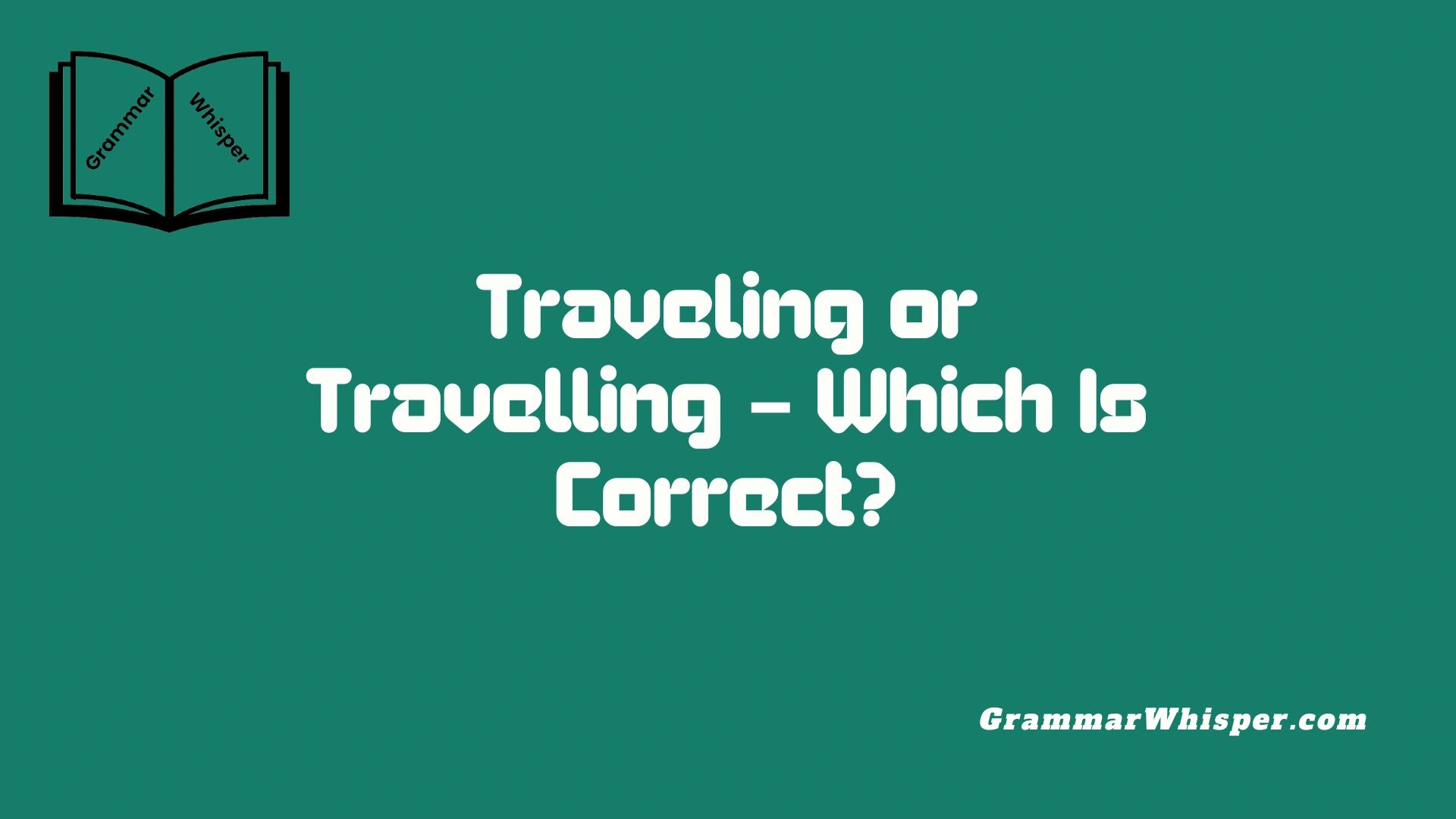When writing for a global audience, it’s vital to understand how small language choices can influence readability and professionalism. Words like Traveling or Travelling are prime examples of this subtle, yet important, variation. While they appear nearly identical, the version you choose can signal attention to regional norms, audience expectations, and even brand tone. In American English, the simplified form – Traveling with a single L – is standard due to a spelling rule that drops the final consonant. However, in the UK and other English-speaking regions, Travelling with a double L remains the preferred spelling.
This difference isn’t just grammatical – it touches on cultural perception and the clarity of your message. From academic publishing to business writing, using the appropriate variant of English shows a deep understanding of your reader’s linguistic background. As a seasoned content strategist, I’ve seen how misalignment in spelling can reduce credibility or disrupt reader trust. In formal settings – like a company report, journal, or professional blog – matching your language to your audience reflects not only linguistic awareness but also your commitment to effective communication. Great writers don’t just follow grammar rules – they choose language that resonates, clarifies, and connects.
For example:
| Region | Preferred Spelling | Usage Context |
| United States | Traveling | Business memos, press releases, academic papers |
| United Kingdom | Travelling | Government reports, journalistic content |
| Canada | Travelling | Formal reports, educational content |
| Australia | Travelling | Publishing, legal documents |
Key Point: If your reader is in the U.S., use traveling. If your audience is in the UK or Commonwealth nations, stick with travelling. Aligning your spelling to the region shows cultural awareness and writing precision.
Editorial Style Guides
Many professional platforms and institutions follow style guides that dictate spelling preferences:
- AP Style (U.S. media): Traveling
- Chicago Manual of Style (U.S. academia): Traveling
- Oxford Style Manual (British): Travelling
Tip: Check the relevant style guide if you’re unsure which spelling is preferred by the platform or institution.
Consistency in Language Use Across Different English-Speaking Countries
Whether you’re creating content for a global website or writing international correspondence, consistency in spelling is crucial for readability and professionalism.
Why Consistency Matters
- Enhances credibility: Mixed spelling (e.g., using “travelling” in one paragraph and “traveling” in another) can seem careless.
- Improves readability: Readers subconsciously detect inconsistencies.
- Builds trust: A consistent tone reassures the reader you’re detail-oriented.
Best Practices for Maintaining Consistency
- Choose one English variety and stick to it throughout the document.
- Use a proofreading tool like Grammarly, ProWritingAid, or built-in spelling checkers in MS Word to enforce spelling rules.
- Set your language settings (e.g., “English (US)” or “English (UK)”) in your word processor.
“Language is power. Consistency in language is clarity in power.” – Adapted from Robin Lakoff, linguist
Adapting Your Spelling to the Audience
The golden rule of communication is know your audience. Your spelling should reflect the linguistic expectations of those you’re addressing.
Case Studies
Case Study 1: International Marketing Campaign
- A U.S. firm launching a campaign in London translated all documents from traveling to travelling to appear native and credible.
- Result: 12% increase in engagement in British markets.
Case Study 2: Academic Publishing
- An Australian researcher publishing in an American journal switched from travelling to traveling as per the publisher’s house style.
- Result: Manuscript accepted without delays.
Quick Tip Table
| Audience Locale | Use This Spelling |
| American | Traveling |
| British | Travelling |
| Canadian | Travelling |
| Global Mixed | Choose one and stay consistent |
Remember: Your readers appreciate when your writing feels familiar. Adapt your style – not just spelling – to your audience’s expectations.
Common Usage in Journalism and Literature
The media landscape reflects the broader rules of regional spelling, and journalism plays a key role in reinforcing them.
In Journalism
- The New York Times: Always uses traveling in line with American English.
- The Guardian (UK): Sticks with travelling consistently.
- The Globe and Mail (Canada): Uses travelling.
Here’s a quick look at real-world usage in headlines:
| Publication | Headline Snippet | Spelling Used |
| CNN Travel | “Traveling on a Budget in 2024” | Traveling |
| BBC News | “Tips for Travelling Abroad This Summer” | Travelling |
| National Geographic | “Traveling the Ancient Silk Road” | Traveling |
| The Sydney Morning Herald | “Travelling Safely in Asia” | Travelling |
In Literature
Authors generally follow the conventions of their native dialect, and publishers reinforce these through their editorial teams.
- J.K. Rowling (UK): Travelling
- Stephen King (U.S.): Traveling
Even within fiction, spelling can subtly ground the reader in a geographic context.
Final Thoughts
The difference between traveling and travelling is more than just an extra “L.” It’s a reflection of cultural identity, linguistic evolution, and audience-centric communication. Whether you’re a student, writer, marketer, or just someone crafting a travel blog, choosing the right version shows attention to detail and a desire to connect clearly with your reader.
Use “traveling” in American English. Use “travelling” in British, Canadian, and Australian English. And most importantly, be consistent and considerate of your audience.
FAQs
What’s the main difference between “traveling” and “travelling”?
The difference is purely regional. Traveling is used in American English, while travelling is standard in British English and most other English-speaking countries outside the U.S.
Is one version more correct than the other?
No. Both are correct in their respective regions. The key is to match your spelling to the dialect of your audience or the style guide you’re following.
Do grammar checkers catch spelling inconsistencies?
Yes. Tools like Grammarly, Hemingway, and even Google Docs can catch dialect mismatches if you set your language preferences correctly.
Why do some people double the “L” and others don’t?
This comes from a spelling rule in British English: words that end in a vowel + consonant double the final consonant when adding a suffix (e.g., travel → travelling). American English often omits the double consonant in such cases.
Should I use “traveling” or “travelling” in a global document?
Pick one version and be consistent throughout the document. If your audience is primarily American, use traveling. If it’s global or British Commonwealth, travelling is typically safer.











